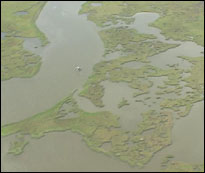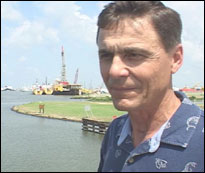But a few years ago, Milling had a revelation. And today, this banker is spearheading an environmental crusade. He takes me to his wood-paneled chambers to show what changed him.
"I think you begin to understand the magnitude when you look at this."
| |

Lousiana's vanishing wetlands. Photo: Photo: William Brangham/NOW with Bill Moyers |
Milling unfurls a map of Louisiana on his conference table. The way he tells the story, an environmentalist stopped by a few years ago to talk about the wetlands. He told Milling that if they keep disappearing, it could wipe out some kinds of fish. It could wipe out millions of migratory birds that stop in the wetlands every year. Milling says as the activist kept talking, he started getting annoyed. But then something suddenly clicked. At this point in the story, Milling's voice drops almost to a whisper. When he talks, people lean forward to hear him.
"Finally I looked up at him in the middle of it and said, 'My friend, the heck with the birds and the fishes.' I think it jolted him a little bit and I said, 'This is not about the birds and the bees, it's about whether the economic prosperity of Louisiana can continue.'"
Milling says, here's what hit him: Banks like his have invested billions of dollars in businesses across the region. He points to the dots sprinkled across the map. He says you'll find a Whitney National Bank in the heart of every one of those towns.
"You know this whole area is composed of ship-building yards, fabrication yards, gas-processing plants, chemical installations.
"Those towns that are located up and down the various bayous and rivers form the cornerstone of wealth in south Louisiana."
And on this map, those towns are surrounded by splotches of red and pink— which signifies that the wetlands around them are vanishing. Milling says the more he looked at the map, the more he realized that if the wetlands wash away, his bank's investments could wash away. The state's whole economy could be crippled.
"It has everything to do with whether or not Louisiana as we know it will survive in the future."
Barnstorming the State
So this powerful banker has decided to help lead a campaign to try to save the wetlands. King Milling is barnstorming around the state. He's preaching to power-brokers who'd think twice about letting an environmentalist through their doors. He's giving speeches to the Chamber of Commerce and the Top 50 Businessmen's Club. He's lobbying fellow bankers and lawyers. And Milling keeps telling them, "If you still don't understand why the wetlands are crucial, please drive to a spot on Louisiana's coast and talk to a man named Ted Falgout."
| |

Ted Falgout runs Port Fourchon, the command center for the oil and gas industry on the Gulf Coast. Photo: Photo: William Brangham/NOW with Bill Moyers |
"This little dot on the map, this small place in Cajun southeastern Louisiana, on the Gulf of Mexico," Falgout will tell you, "plays a strategic role in furnishing this country with somewhere between 16 and 18 percent of its entire hydrocarbon supply— that's oil and gas."
The Oil and Gas Industry's Command Center
They call this place Port Fourchon. This is the base, the command center, which supports the huge oil and gas industry out in the Gulf of Mexico. It's like a giant scar in the middle of the wetlands. There's a jumble of ships and docks and helicopters, and oil refineries and barbed wire. And then just beyond them you can see the beginnings of miles of grassy marsh. Ted Falgout runs Port Fourchon for the state. He says, "You think the Alaska pipeline's important? This place handles twice as much oil and gas."
"There's no other place in this country," continues Falgout, "that plays such a great role in providing this nation's oil and gas supply."
There are thousands of offshore drilling rigs out in the Gulf of Mexico. They send a lot of their oil and gas to the mainland through this port. The U.S. buys millions of barrels of oil from the Middle East. Much of that fuel comes to America through this port. And here's the problem: The industry distributes most of that fuel through pipelines, which are buried under the wetlands, all along this coast.
"We look just to my right here and we have the Mars pipeline. This is a pipeline from the deep-water Gulf of Mexico. This single pipeline is carrying 400,000 barrels of crude oil a day through it. And as the marsh deteriorates, these pipelines are vulnerable," Falgout says.
The energy companies dug trenches deep in the soil, on the assumption that would keep the pipelines safe. But now the land around them is crumbling.
Next: Exposed Pipes

